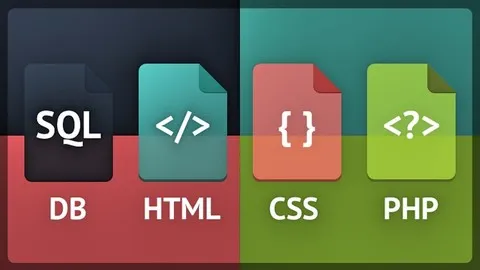
Web Developer Basics 
This course will teach you the basics of web development. You'll learn the fundamentals of HTML, CSS, and JavaScript, the three most common web programming languages. You'll also learn how to create and style webpages, and how to use the latest web development tools. By the end of the course, you'll have the skills to create and maintain your own websites. ▼
ADVERTISEMENT
Course Feature
![]() Cost:
Cost:
Free
![]() Provider:
Provider:
Udemy
![]() Certificate:
Certificate:
No Information
![]() Language:
Language:
English
![]() Start Date:
Start Date:
Self Paced
Course Overview
❗The content presented here is sourced directly from Udemy platform. For comprehensive course details, including enrollment information, simply click on the 'Go to class' link on our website.
Updated in [May 25th, 2023]
This course provides an introduction to the basics of web development. Students will learn the fundamentals of the most common web programming languages, such as HTML, CSS, and JavaScript. They will also gain an understanding of the different roles and responsibilities of web developers, and the tools and techniques used in the development process. By the end of the course, students will have the knowledge and skills necessary to create basic web applications.
[Applications]
After completing this course, students should be able to apply their knowledge of web development basics to create basic webpages and applications. They should be able to use HTML, CSS, and JavaScript to create webpages and applications that are interactive and visually appealing. Additionally, they should be able to use frameworks such as Bootstrap and jQuery to create more complex webpages and applications. Finally, they should be able to use version control systems such as Git to manage their code and collaborate with other developers.
[Career Paths]
1. Front-End Web Developer: Front-end web developers are responsible for creating the visual elements of a website, such as the layout, design, and user interface. They use HTML, CSS, and JavaScript to create the look and feel of a website. This role is becoming increasingly important as more websites are designed to be mobile-friendly and responsive.
2. Back-End Web Developer: Back-end web developers are responsible for the server-side of a website. They use programming languages such as PHP, Ruby, and Python to create the logic and functionality of a website. This role is becoming increasingly important as more websites are designed to be dynamic and interactive.
3. Full-Stack Web Developer: Full-stack web developers are responsible for both the front-end and back-end of a website. They use a combination of HTML, CSS, JavaScript, and server-side programming languages to create a complete website. This role is becoming increasingly important as more websites are designed to be complex and interactive.
4. Mobile App Developer: Mobile app developers are responsible for creating mobile applications for smartphones and tablets. They use a combination of HTML, CSS, JavaScript, and native mobile development languages such as Swift and Java to create mobile applications. This role is becoming increasingly important as more businesses are creating mobile applications to reach their customers.
[Education Paths]
1. Bachelor of Science in Computer Science: This degree program provides students with a comprehensive understanding of computer science principles and their application to the development of software and web applications. Students learn the fundamentals of programming languages, software engineering, and computer architecture. Additionally, they gain experience in developing web applications and databases. This degree is ideal for those interested in pursuing a career in web development, as it provides the necessary skills and knowledge to succeed in the field.
2. Bachelor of Science in Information Technology: This degree program focuses on the application of technology to solve business problems. Students learn the fundamentals of computer programming, software engineering, and database design. Additionally, they gain experience in developing web applications and databases. This degree is ideal for those interested in pursuing a career in web development, as it provides the necessary skills and knowledge to succeed in the field.
3. Master of Science in Computer Science: This degree program provides students with an advanced understanding of computer science principles and their application to the development of software and web applications. Students learn the fundamentals of programming languages, software engineering, and computer architecture. Additionally, they gain experience in developing web applications and databases. This degree is ideal for those interested in pursuing a career in web development, as it provides the necessary skills and knowledge to succeed in the field.
4. Master of Science in Information Technology: This degree program focuses on the application of technology to solve business problems. Students learn the fundamentals of computer programming, software engineering, and database design. Additionally, they gain experience in developing web applications and databases. This degree is ideal for those interested in pursuing a career in web development, as it provides the necessary skills and knowledge to succeed in the field.
The development of web technologies is rapidly evolving, and the demand for web developers is increasing. As such, these degree paths provide learners with the necessary skills and knowledge to succeed in the field. Additionally, these degree paths provide learners with the opportunity to stay up-to-date with the latest trends in web development, as well as the ability to develop innovative solutions to complex problems.
Pros & Cons

Very useful content

Clear and covers main topics

Great practical knowledge of PHP

Simple and clear for beginners

Camera focusing needs improvement

English grammar and vocabulary need improvement

Subtitles matter needs attention

Not suitable for advanced learners
Course Provider

Provider Udemy's Stats at AZClass
Discussion and Reviews
0.0 (Based on 0 reviews)
Explore Similar Online Courses

Try AngularJS: Beginners Guide to Front End Web Development

Building Android Apps with Kotlin: Getting Started

Python for Informatics: Exploring Information

Social Network Analysis

Introduction to Systematic Review and Meta-Analysis

The Analytics Edge

DCO042 - Python For Informatics

Causal Diagrams: Draw Your Assumptions Before Your Conclusions

Whole genome sequencing of bacterial genomes - tools and applications
![How to Build A Coaching Website [ FREE + FAST ]](/ccsimg/dcs/img_tools/76a1262f8eaba7a012f0aaec7c7c1974.webp)
How to Build A Coaching Website [ FREE + FAST ]

HTML CSS and Javascript for Web Developers

Web Design for Everybody: Basics of Web Development & Coding
 Related Categories
Related Categories
 Popular Providers
Popular Providers
Quiz
 Submitted Sucessfully
Submitted Sucessfully
1. Which of the following is a web programming language?
2. Which of the following is not a web programming language?
3. Which of the following is a web development framework?
4. What is HTML?
Correct Answer: It is a markup language.


Start your review of Web Developer Basics